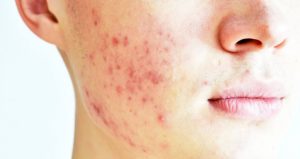
Acne, commonly known as pimples, and also known as Acne vulgaris, Cystic acne, Zits. It is more common and more severe in males than females in their teens. Contrary to belief pimples do not clear spontaneously when maturity is reaches. 6% patients may have the disease continuing up to 25 to 40 years of age. There is genetical predisposition and similar involvement may occur in identical twins. Androgens play a positive role. Oily and glossy skin is more predisposed.
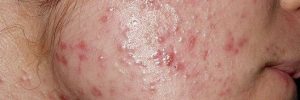
There is blockage of sebaceous ducts at the surface of sebaceous the skin with keratinization and melanin deposits from hair follicle giving rise to the characteristic black head spots (comedon) or early acne. The lesions are likely to occur in areas like face, shoulder and upper chest where sebaceous glands are in plenty. Retained sebum inside the gland and growth of Propionibacterium acne, an anaerobic diphtheroids normally present within pilo-sebaceous duct sets in complement mediated inflammation so that the blackhead turns to a vesicle and pustule. The pustules are sterile on routine culture. When the pustule bursts the chemo irritant (Chemotherapy)fatty acid content of sebum causes inflammation on surrounding skin. Following rupture and healing, deep pitted scars may from which progress to keloid.
Excess of androgen secretion due to tumor of adrenal, ovary or tests be excluded. Polycystic ovary need exclusion by pelvic ultrasound. 21 hydroxylase deficiency causing adrenal hyperplasia has excess of androgen secretion too.
Besides mild in itching, soreness of pain, there is more of self consciousness, embarrassment and psychic trauma. The morbid fear of scarring and pitting always haunts the patient, especially the girls.
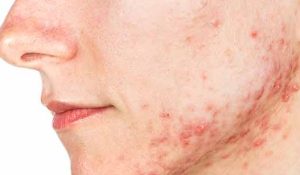
Initial lesion
Comedones-Conical raised lesion with broad base and plugged apex. Plug may be black (black head) or white (white head) 25% white heads resolve, 75% develop into inflamed lesion.
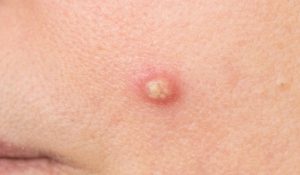
Symptoms
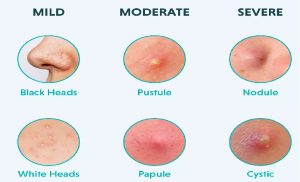
Acne commonly appears on the face and shoulders. It may also occur on the trunk, arms, legs, and buttocks
Blackheads
Crusting of skin bumps
Cysts
Papules (small red bumps)
Pustules
Redness around the skin eruptions
Scarring of the skin
Whiteheads
Inflammatory lesion : severity grades
Gr. 1 (Mild) : Open and closed comedones
Gr. 2 (Moderate) : Comedones, papules, few pustules
Gr. 3 (Severe ) : Predominant pustules, nodules, abscesses
Gr. 4 : Mainly cysts and abscesses. Wide spread scarring as Inflammatory lesions resolve.
Patients should be discouraged to apply oils and greases on the affected area.
Treatment
SELF-CARE
Clean your skin gently with a mild, nondrying soap. Remove all dirt or makeup. Wash once or twice a day, including after exercising. However, avoid scrubbing or repeated skin washing.
Shampoo your hair daily, especially if it is oily. Comb or pull your hair back to keep the hair out of your face.
Try not to squeeze, scratch, pick, or rub the pimples. Although it might be tempting to do this, it can lead to skin infections and scarring.
Avoid wearing tight headbands, baseball caps, and other hats
Avoid touching your face with your hands or fingers.
Avoid greasy cosmetics or creams. Take off make-up at night. Look for water-based or “noncomedogenic” formulas. Noncomedogenic products have been tested and proven not to clog pores and cause acne.
If these steps do not clear up the blemishes, try over-the-counter acne medications. You apply these products directly to your skin.
They may contain benzoyl peroxide, sulfur, resorcinol, or salicylic acid.
They work by killing bacteria, drying up skin oils, or causing the top layer of your skin to peel.
They may cause redness or peeling of the skin.
A small amount of sun exposure may improve acne a little, but mostly it just hides the acne. However, too much exposure to sunlight or ultraviolet rays is not recommended because it increases the risk for skin cancer.
Topical theraphy : Retinoids
Antibiotics : Erythromycin, tetracycline, Benzyl peroxide
Homoeopathy and other traditional mode of treatment can also give good results.
medlight2u.com
Acne Acne vulgaris Acute Renal Failure Adrenal cortex Angina Angina Pectoris Aortic Regurgitation (AR) Aortic Stenosis (AS) Chest pain Chronic pyelonephritis Coarctation of Aorta Cough cyanosis Cystic acne Dehydration depression Diabetes Mellitus Diagnosis of Aortic Stenosis Dr.KTS DR K TAMILSELVAN Fatigue Heart Failure Hypertension Hypokalemia Hypothyroidism Ischemic Heart Disease LBBB Mitral Incompetence Mitral insufficiency Mitral valve prolapse Nocturia Patent Ductus Arteriosus PDA Polyuria Proteinuria pulmonary hypertension Pulmonary Stenosis ST Depression Symptoms of Acne Syncope Treatment for acne valvular heart disease Ventricular Septal Defect VSD Zits

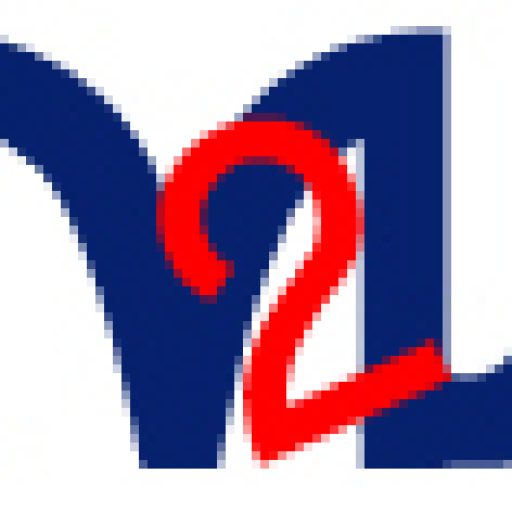
Leave a Reply